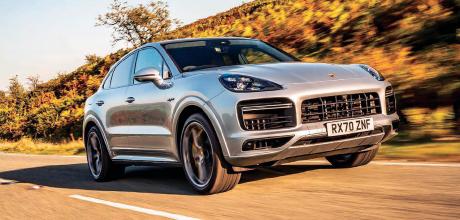2024 Porsche Cayenne Turbo S E-Hybrid Coupe
Those unfamiliar with the Cayenne Coupe range might be forgiven for thinking the Turbo GT is the most powerful model in the current line-up. They’d be wrong — the Turbo S E-Hybrid not only comes with a rip-roaring V8, but also an eco-friendly plug-in hybrid system boosting power to almost 680bhp...
Words James Fossdyke
Photography Barry Hayden
A PORSCHE FOR ALL SEASONS
Cayenne Turbo S E-Hybrid Coupe driven
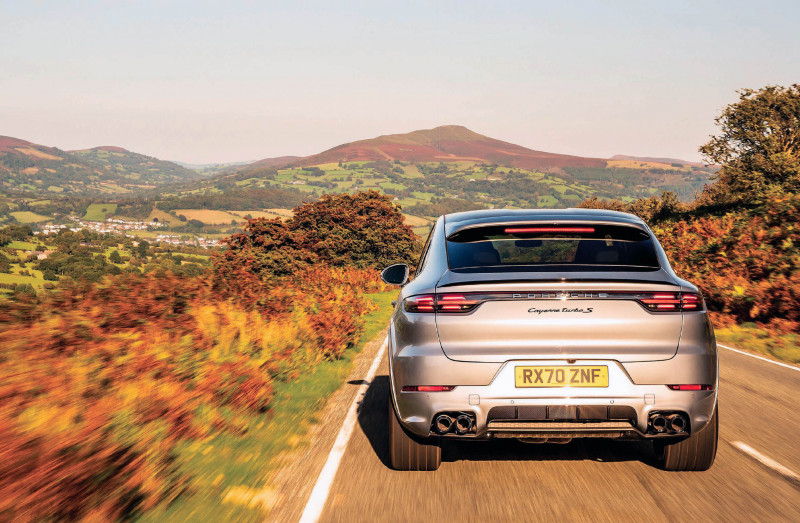
IF YOU WANT A CAR WHICH WILL TAKE YOU TO THE ALPS IN RECORD TIME, BUT CAN MOOCH SILENTLY IN TOWN, THEN THIS IS THE PORSCHE FOR YOU
Let’s jump straight in. The Cayenne Turbo S E-Hybrid Coupe is essentially a Cayenne Turbo loaded with the plug-in hybrid system found on the V6- powered Cayenne E-Hybrid, meaning there’s a four-litre V8 and a 100kW electric motor (fed by a 19.4kWh battery pack) to play with. Officially, this means the Turbo S E-Hybrid Coupe will cover forty kilometres on electric power alone. Recharging the battery using a 7.2kW domestic ‘wallbox’ charging system takes less than three hours. Theoretically, then, if you work twenty miles from home, and providing you can charge your Porsche when you get to your place of employment, you need never use a drop of petrol on your commute to and from the office. And, if you want to travel further afield, you’ve always got the flexibility — and the five-minute refuelling time — of the internal combustion engine to fall back on.
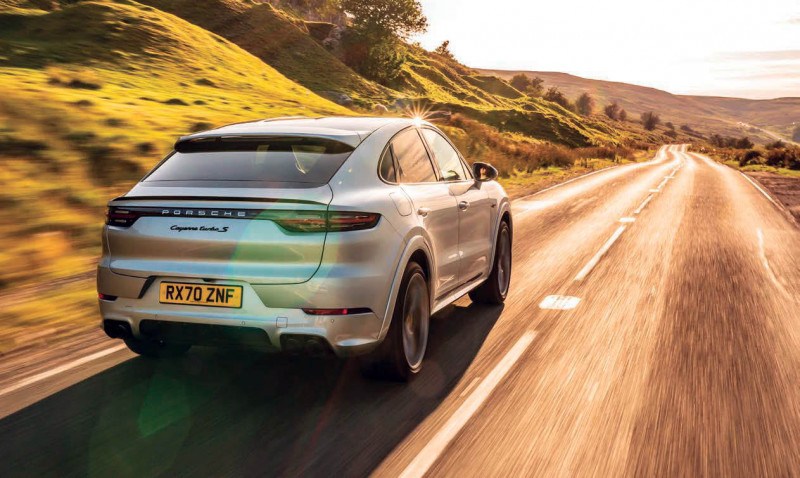
All of which means the Cayenne Turbo S E-Hybrid Coupe’s plug-in hybrid system could radically reduce your fuel costs. Indeed, Porsche claims the model is good for between 68.9 and 74.3mpg, but you’ll have to be very sparing with use of the petrol engine to achieve as much. Admittedly, with the electric motor producing 134bhp all by itself, getting around on silent electric power doesn’t feel like too much of a hardship, though it’s hardly the most exciting way of travelling from A to B.
Irrespective of whether you stick to using battery power, plug-in hybrid Cayennes provide certain tax advantages making them very appealing to drivers of company cars. With official carbon dioxide emissions of between 87 and 92g/km, the Turbo S E-Hybrid may not be as eco-friendly as the V6-engined E-Hybrid, but it isn’t too far behind. And the UK’s Benefit-in-Kind (BIK) company car taxation system means you’re looking at a twenty-two or twenty-three percent tax bill when most other V8- powered SUVs hit the top rate of thirtyseven percent.
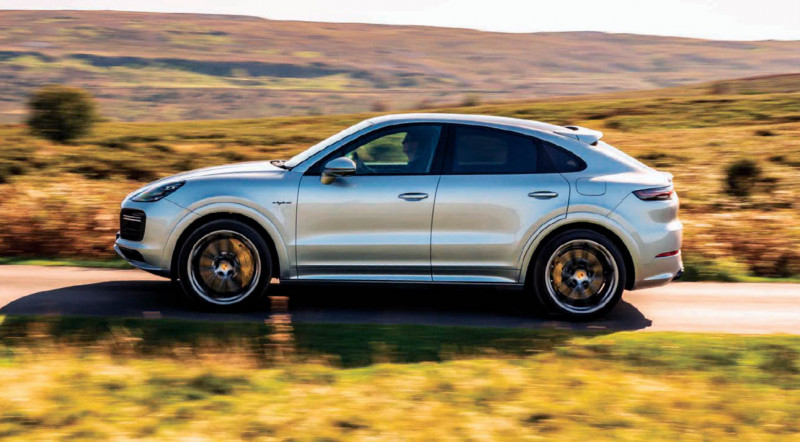
Frankly, though, while all this stuff is very worthy, it isn’t very awe-inspiring. Moreover, it feels unfair to view the Turbo S E-Hybrid through such an uninteresting lens, especially when we’re talking about a Cayenne Coupe that’s supposed to appeal to the heart, rather than the head. After all, if you’re buying a Cayenne solely on the basis of facts and figures, you’ll probably end up with the conventional SUV body shape and the slightly more efficient V6 E-Hybrid.
The Turbo S E-Hybrid, meanwhile, has only half an eye on economy. Performance is still very much the name of the game, which is why, when you combine output of the electric motor and the twin-turbocharged V8, you’ve got near 680bhp to play with. For reasons unknown, that’s twenty ponies less than you get from the Panamera Turbo S E-Hybrid, which has much the same setup, but doesn’t matter one bit — there’s more than enough power at the disposal of your right foot, and though the Cayenne Turbo S E-Hybrid weighs more than two and a half tonnes, it’ll still get from rest to 62mph in less than four seconds, accelerating all the way to a lofty 183mph.
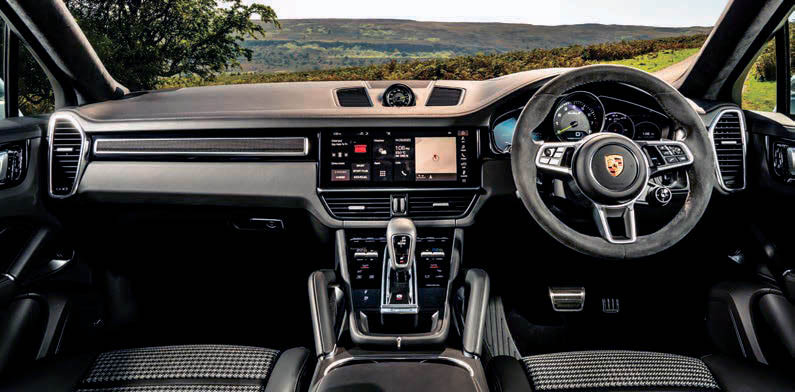
This might not sound all that impressive by modern Porsche standards, but the Turbo S E-Hybrid is still faster than plenty of 911s. And you can’t fail to be thrilled by that fabulous V8, which sounds utterly glorious when pushed. It snarls and growls its way up the rev range in aristocratic-but-aggressive manner, exuding menace without ever feeling yobbish or uncouth. What’s more, the engine has an uncanny knack of knowing when to be quiet and when to be loud. If you’re minding your own business on the motorway, delivery is smooth and hushed, with only a faint burble of menace coming from behind the back seats. In contrast, when you open the taps, all hell breaks loose. It’s brilliant. The Turbo S E-Hybrid makes alarming progress along the road, too, pinning you into your seat and catapulting you along the asphalt. Ordinarily, an automatic (or semi-automatic) sports SUV might spend a few moments getting its ducks in a row after you press the accelerator, whereas the Turbo S E-Hybrid uses its electric motor to fill the void, offering moderate surge before the V8 smashes you in the back like a petrol-powered sledgehammer.
For such a big car, the drive is mighty impressive, but there’s no hiding the enormous bulk at play. The Turbo S E-Hybrid Coupe might have forty horsepower more than the Turbo GT, but it’s more than three hundred kilograms heavier. It shows, too.
Where the Turbo GT feels like a thoroughbred — all eager and alert — the Turbo S E-Hybrid feels like more of a bruiser. A kind of heavyweight prize-fighter packing a mighty punch. Despite the sensation of weight, this Cayenne Coupe is still epic in bends. Of course, it doesn’t feel as nimble as the Turbo GT, but were it not for that Urus-rivalling range-topper, we’d be heralding this as the Cayenne to beat. In fairness, the Turbo S E-Hybrid doesn’t try to mask its weight, instead choosing to ignore it, as if it simply isn’t a problem. Somehow, it isn’t.
STICKY PATCH
The steering is, of course, sublime, and the whole car responds remarkably quickly to your commands. Naturally, there’s a bit of body roll when you tip the car into a corner, and although the stiffer suspension modes do a good job of minimising the effect, even they can’t defeat physics. What they will do is keep the Cayenne stable and ensure those massive tyres stay in touch with the asphalt below, which means this Porsche always feels planted and rooted to the road.
Although it feels much heavier and less dynamic than the Turbo GT, the Turbo S E-Hybrid feels agile in its own way. It isn’t exactly a flea hopping from corner to corner, but it’s capable of carrying outrageous speed through surprisingly tight bends. And because it’s so big, it doesn’t feel as fast as it really is, meaning you experience surprise when you look down at the dash dials and realise you didn’t take the corner quite as slowly as you thought.
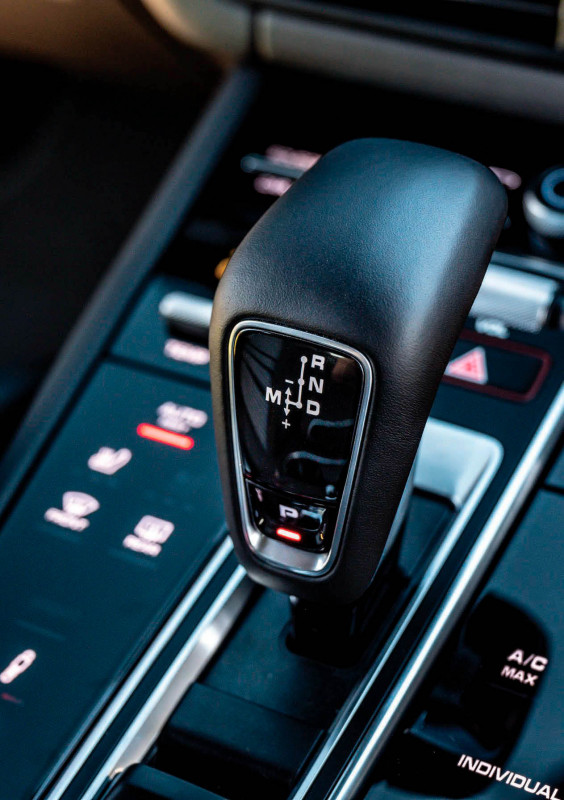
For all its stability and body control, though, the Turbo S E-Hybrid is a magnificently comfortable machine. Most cars of this ilk, including the Turbo GT, come with a trade-off seeing handling played against comfort. There’s none of that here. The Turbo S E-Hybrid is remarkably comfortable, even in its sportier suspension settings, although the softest ride makes you feel as though you’re driving on a bed of pillows. The odd bump makes its presence felt, but for the most part, the Cayenne glides down the road. It’s an astonishing feat for a vehicle so heavy and so rapid.
It’s quiet. Of course, the electric motor doesn’t make a massive amount of noise, and we’ve already discussed the discretion of the V8, but the way this car can waft along at breakneck speed is something to behold. It’s as hushed as you expect from a luxury saloon, even when cruising down an A-road at a vast rate of knots. This, combined with the excellent ride, makes the Turbo S E-Hybrid an absolutely fantastic long-distance tourer. Put it this way, if you want a car which will take you from the UK to the Alps in record time, but can mooch silently in town at either end of the journey, all the while carrying a huge amount of luggage and passengers, then this is the Porsche for you.
It should cope in snow, too, and not just because all-wheel drive is standard. While every version of the Cayenne is configured primarily for road use — they are Porsches, after all — even the Turbo S E-Hybrid has a modicum of off-road capability. With adaptive suspension, it can be raised and lowered for extra ground clearance or improved handling, while the optional rear axle steering helps to reduce the turning circle. Porsche Traction Management (PTM) is standard equipment, sending power to whichever wheel has the most grip. If you so wish, Porsche will sell you a spare set of wheels with winter tyres and a set of Cayenne-specific snow chains. And if towing’s your thing, the Turbo S E-Hybrid will pull three tonnes.
Not that you’re likely to need a trailer, given the amount of space inside a Cayenne Coupe. Of course, this particular body shape does somewhat reduce boot space when compared with the capacity of the standard Cayenne — the fastback models offer 180 litres less luggage capacity than their conventionally shaped counterparts. Equally impactful is the hybrid system, which cuts the space available close to a hundred litres — where a Cayenne Turbo Coupe offers 565 litres of load space, the Turbo S E-Hybrid Coupe makes do with 460 litres. Even this should be more than enough for most buyers, particularly given the ability to fold down the rear seats, resulting in 1,400 litres of luggage space. Still left wanting? You can always fit a roof box — although there are no roof rails, cross bars can be fitted to the Coupe’s tin-top.
SAME DIFFERENCE
As well as being relatively practical, the Turbo S E-Hybrid Coupe’s interior is also remarkably well appointed. There’s little in the way of special treatment for this model, testament to the brilliance of all current Cayenne cabins, but there are eighteen-way adjustable front seats and a tell-tale identifier in the form of hybrid-specific green details on the part-analogue, part-digital driver display. As you’d expect, everything feels superbly engineered and all materials are first-rate. And Porsche’s latest-generation infotainment system is a clear improvement on its predecessor, delivering a more modern design and simpler menus. We aren’t sold on the single-panel switchgear on the centre console — it quickly becomes covered in grubby fingerprints — but it’s better than the buttons which used to line up either side of the gear lever.
While Porsche may not have added too much to the Turbo S E-Hybrid’s interior, there are notable exterior upgrades. E-Hybrid badging is in place and green brake calipers are fitted as standard, but the front end is also subtly different, featuring larger intakes and air blades. All this comes with one drawback, though: the price.
The cost of a Cayenne Turbo S E-Hybrid Coupe starts at £136,400, making it twenty grand more expensive than the Turbo Coupe and only fourteen less than the faster Turbo GT. And this is before you consider any optional extras, which you’ll almost certainly want to add. Standard specification is reasonable, of course, but some useful features are missing, including privacy glass, keyless entry and wireless phone charging, as well as the 360° camera and adaptive cruise control, the latter pitched at £1,200. Then again, menu buying has always been the case with Porsches.
The Turbo S E-Hybrid Coupe is little different, but even in standard trim, it’s an astonishing piece of equipment making long-distance travel a breeze. It’s understandable some will consider a coupe-styled Cayenne with an electric motor somewhat compromised, but the Turbo S E-Hybrid is nothing short of tremendous, rewarding drivers with silent, efficient motoring in town, ample cruising ability and sports car handling when you reach more exciting roads. For the majority of buyers (who don’t want or need the aggression of the Turbo GT), this is arguably the best Cayenne Coupe in production. It’s certainly the greatest all-rounder.
Above If you’re looking for a Cayenne blending the best of the range into a single package, there’s a strong argument for this being it
TECHNICAL DATA 2024 Porsche Cayenne Turbo S E-Hybrid Coupe
- Model Cayenne Turbo S E-Hybrid Coupe
- Price From £136,400
- Engine 4.0-litre twin-turbocharged V8 petrol plus electric motor and 17.9kWh lithium-ion battery pack
- Transmission AWD, eight-speed dual-clutch PDK with PTM
- Economy 68.9-74.3mpg
- CO2 emissions 87-92g/km
- Top speed 183mph
- 0-62mph 3.8 seconds
- Power 671bhp
- Torque 664lb-ft at 2,100-4,500rpm
Above At 2,535kg, the Turbo S E-Hybrid is no featherweight, but it’ll still romp to 62mph from standstill in less than four seconds
Right Fold the rear seats down for a useful 1,400 litres of luggage space Below Combustion engine takes the form of a four-litre V8 loaded with twin Turbochargers.
Below Cabin is little different from standard Cayenne fayre, save for green flashes reminding you you’re in charge of a Porsche hybrid model


